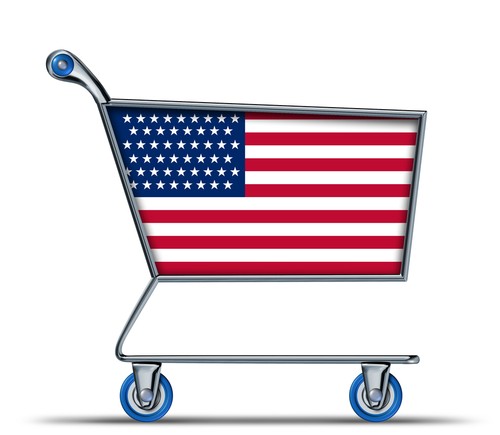Consumer Sentiment Falls in April
Based on the latest data from the Thomson Reuters/University of Michigan Consumer Sentiment Index, American are not as optimistic about the state of the U.S. economy as they had demonstrated in March. April’s index plummeted to a nine month low from 78.6 to 72.3. The reading came in lower than any of the predictions by the 69 economists who responded to the Bloomberg survey . Their estimates ranged from 74 to 84.5.
In the five years prior to the 18 month recession, the consumer sentiment index averaged a reading of 89. During the recession, from December 2007 to June 2009, the index averaged 64.2.
Future expectations
According to Action Economics LLC’s chief economist Mike Englund, “We’ve got some powerful cross-currents going on with consumer confidence. Point to the 2% hike in payroll taxes, “when you look at actual spending, it’s been remarkable how firm spending was in January and February,” said Englund before the release of the index.
However, the tightening of the purse strings mandated by sequestration may have finally affected consumer confidence. The non-partisan Congressional Budget Office expects budget cuts to reduce economic growth by 1.5 percentage points.
The preliminary release also shows that respondents to the survey were pessimistic about expectations six months from now, as this rating fell from 70.8 in March to 64.2. Workers anticipate their permanent after-tax incomes to decline.
Consumers continue to remain positive about their plans to buy homes and automobiles in the future. This is in spite of the number of respondents who expect the unemployment rate to increase, 32 percent, compared to the 24 percent who anticipate a decrease.
Other Economic News
The index reading comes on the heel of Commerce Department data that show retail sales falling to the lowest in nine months with a 0.4 percent decrease in March. Many analysts expected the reading for the indicator to come in flat. The decline in consumer spending supports concerns that the the general economy continues to have difficulties getting on a track sustainable growth.
The disappointing retails sales figures prompted Barclays to lower its prediction for first quarter growth to 2.8 percent compared to its original estimate of 3.2 percent.
Despite the drop in the confidence indicator and retail sales, the equities market has reached its all-time high and home prices continue to appreciate. The real estate analytics firm Corelogic reports a 10.2 percent year-over-year increase in the median home price for February.
This positive news seemed to be enough to keep consumer spending from losing its momentum in the first few months of the year. Some economists believe that the positive retail sales numbers in January and February may have occurred as a result of the warmer than usual winter. Furthermore, the effects of the payroll tax increase and spending cuts have started to come to the surface.
Consumer Sentiment Falls in April
Based on the latest data from the Thomson Reuters/University of Michigan Consumer Sentiment Index, American are not as optimistic about the state of the U.S. economy as they had demonstrated in March. April’s index plummeted to a nine month low from 78.6 to 72.3. The reading came in lower than any of the predictions by the 69 economists who responded to the Bloomberg survey . Their estimates ranged from 74 to 84.5.
In the five years prior to the 18 month recession, the consumer sentiment index averaged a reading of 89. During the recession, from December 2007 to June 2009, the index averaged 64.2.
Future expectations
According to Action Economics LLC’s chief economist Mike Englund, “We’ve got some powerful cross-currents going on with consumer confidence. Point to the 2% hike in payroll taxes, “when you look at actual spending, it’s been remarkable how firm spending was in January and February,” said Englund before the release of the index.
However, the tightening of the purse strings mandated by sequestration may have finally affected consumer confidence. The non-partisan Congressional Budget Office expects budget cuts to reduce economic growth by 1.5 percentage points.
The preliminary release also shows that respondents to the survey were pessimistic about expectations six months from now, as this rating fell from 70.8 in March to 64.2. Workers anticipate their permanent after-tax incomes to decline.
Consumers continue to remain positive about their plans to buy homes and automobiles in the future. This is in spite of the number of respondents who expect the unemployment rate to increase, 32 percent, compared to the 24 percent who anticipate a decrease.
Other Economic News
The index reading comes on the heel of Commerce Department data that show retail sales falling to the lowest in nine months with a 0.4 percent decrease in March. Many analysts expected the reading for the indicator to come in flat. The decline in consumer spending supports concerns that the the general economy continues to have difficulties getting on a track sustainable growth.
The disappointing retails sales figures prompted Barclays to lower its prediction for first quarter growth to 2.8 percent compared to its original estimate of 3.2 percent.
Despite the drop in the confidence indicator and retail sales, the equities market has reached its all-time high and home prices continue to appreciate. The real estate analytics firm Corelogic reports a 10.2 percent year-over-year increase in the median home price for February.
This positive news seemed to be enough to keep consumer spending from losing its momentum in the first few months of the year. Some economists believe that the positive retail sales numbers in January and February may have occurred as a result of the warmer than usual winter. Furthermore, the effects of the payroll tax increase and spending cuts have started to come to the surface.







